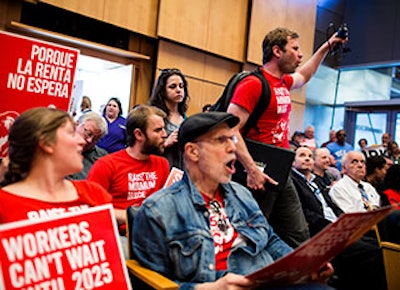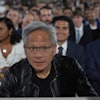
The Seattle City Council unanimously passed an ordinance Monday that would give the city the highest minimum wage in the nation — $15 per hour, which will be phased in over several years, with a slower process for small businesses. The plan gives businesses with more than 500 employees nationally at least three years to phase in the increase. Those providing health insurance will have four years to complete the move. Smaller organizations will be given seven years.
According to a study by the University of Washington, published by The Seattle Times, there is debate over whether the wage increase is a smart way to reduce poverty.
“Critics say a big problem for poor families is the lack of full-time, year-round work, and what they really need are jobs, not a minimum-wage increase,” said the March, 2014 article.
“Supporters of a $15 minimum wage counter that it would raise family incomes after a decade of stagnant pay and improve living standards for the working poor.
In fact, 40 percent of Seattle’s minimum-wage earners live in families at or below the federal poverty level — even if only 8 percent receive food stamps and 2 percent are on welfare, according to the report.”
And despite last night’s vote to move forward, the debate rages on. Here are some of the alternating viewpoints in this national conversation:
The Opposition
- Jordan Weissmann, senior business and economics correspondent for Slate, voiced his concern last month when this plan was still in the proposal phase – specifically citing the possibility that low wage industry workers, like those in fast food, would suffer. “We know that businesses in high-wage countries are especially eager to replace workers with software. Fast-food restaurants in Europe, for instance, have been some of the earliest adopters of labor saving technologies like digital kiosks where customers can order. Those innovations are already beginning to make headway in the United States. But by passing a $15 minimum, Seattle would risk speeding the process up within its city limits,” said Weissmann.
- The International Franchise Association, a Washington, D.C.-based business group that represents franchise owners, said it plans to sue to stop the ordinance. "The City Council's action today is unfair, discriminatory and a deliberate attempt to achieve a political agenda at the expense of small franchise business owners," the group said in a statement.
- This morning, Tim Worstall of Forbes suggested the results could be job losses, a higher unemployment gap between high school and college graduates, and a reduction in non-wage compensation like paid vacation and retirement plans. “Employers look at the total cost of employing people,” said Worstall. “They’re indifferent (that is, they just don’t mind) whether that’s made up of wages only, or wages and benefits, or what the precise mix between the two is (a slight caveat here, it depends on the tax treatment of the various components of the total package). But if you mandate a change in one part of that mix they’ll struggle mightily to make sure that the cost to them of the total package is exactly the same.”
The Support
- In an interview with the LA Times, one of the architects of the $15 minimum — multi-millionaire Nick Hanauer — explained that this effort was one that’s specifically scaled to a larger city. “To be clear, just because you believe raising the minimum wage will help the economy, it does not also mean the higher it goes the better it will be. Fifteen dollars is more or less between the $10.54 it would have been if it had tracked inflation nationally and the $21.70 it would be if it had tracked productivity gains nationally,” Hanauer explained. “Fifteen dollars is a very conservative number that we know for certain the economy can support. And additionally, Seattle, Wash., is a very prosperous and very expensive city to live in. So $15 is a good solid number for a place like this, but probably is too much for a small town in Arkansas where living costs are much, much, much lower.”
Hanauer goes on to defend the measure, citing Australia as a specific case where a high minimum wage did not lead to economic catastrophe. “In Australia, the minimum wage is $17, and unemployment is half of ours…. And they have McDonald’s, too. Most people think that this $15 thing in Seattle is some insane, risky policy departure. That we’re putting our entire economy at risk. You have to remember what few people see — we’re already paying wildly higher wages than other places — $9.32.”
- In March, The Seattle Times cited San Francisco’s wage policy as evidence the increase in Seattle would not cause a drastic or negative impact on employment. So what were the effects of San Francisco’s decade-long incremental increase of both wages and mandated benefits? “Almost none, according to economists at the University of California, Berkeley, who have studied San Francisco, eight other cities that raised their minimum wages in the past decade, and 21 states with higher base pay than the federal minimum.” Added the Times, “Businesses absorbed the costs through lower turnover, small price increases at restaurants, which have a high concentration of low-wage workers, and higher worker productivity, the researchers found.”
Where do you sit on the spectrum? Leave your comments below.
To read more by Anna Wells, sign up for our newsletter. You can also follow Anna on Twitter @IndustrialAnna or contact her by email at [email protected].






















